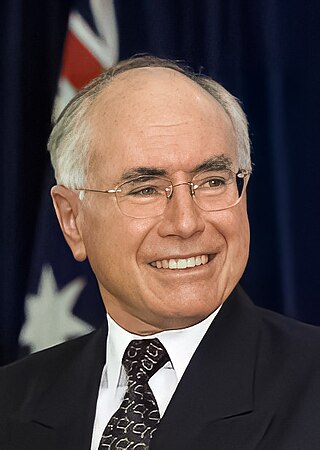Related Research Articles

The 2001 Australian federal election was held in Australia on 10 November 2001. All 150 seats in the House of Representatives and 40 seats in the 76-member Senate were up for election. The incumbent Liberal Party of Australia led by Prime Minister of Australia John Howard and coalition partner the National Party of Australia led by John Anderson defeated the opposition Australian Labor Party led by Kim Beazley. Future Opposition Leader Peter Dutton entered parliament at this election. As of 2023 this was the most recent federal election to have a rematch in 11 years, and the most recent repeated election when Howard beat Beazley just 3 years earlier and until 2013 to have both major party leaders running in previous federal elections as major party leaders when in 2013, and the last for both major party leaders to appear in consecutive federal elections in 24 years.

The 2004 Australian federal election was held in Australia on 9 October 2004. All 150 seats in the House of Representatives and 40 seats in the 76-member Senate were up for election. The incumbent Liberal Party of Australia led by Prime Minister of Australia John Howard and coalition partner the National Party of Australia led by John Anderson defeated the opposition Australian Labor Party led by Mark Latham.
The Division of Adelaide is an Australian electoral division in South Australia and is named for the city of Adelaide, South Australia's capital.
The Division of Barker is an Australian electoral division in the south-east of South Australia. The division was established on 2 October 1903, when South Australia's original single multi-member division was split into seven single-member divisions. It is named for Collet Barker, an early explorer of the region at the mouth of the Murray River. The 63,886 km² seat currently stretches from Morgan in the north to Port MacDonnell in the south, taking in the Murray Mallee, the Riverland, the Murraylands and most of the Barossa Valley, and includes the towns of Barmera, Berri, Bordertown, Coonawarra, Keith, Kingston SE, Loxton, Lucindale, Mannum, Millicent, Mount Gambier, Murray Bridge, Naracoorte, Penola, Renmark, Robe, Tailem Bend, Waikerie, and parts of Nuriootpa and Tanunda.
The Division of Kingston is an Australian Electoral Division in South Australia covering the outer southern suburbs of Adelaide. The 171 km2 seat stretches from Hallett Cove and O'Halloran Hill in the north to Maslin Beach in the south, including the suburbs of Aberfoyle Park, Christie Downs, Christies Beach, Flagstaff Hill, Hackham, Hallett Cove, Huntfield Heights, Lonsdale, Maslin Beach, Moana, Morphett Vale, Old Noarlunga, Onkaparinga Hills, Port Noarlunga, Reynella, Seaford, Sheidow Park, Port Willunga, Trott Park, Woodcroft, and parts of Happy Valley and McLaren Flat.
Liberals for Forests was an Australian political minor party. It contested both state and federal elections between 2001 and 2008, but only ever achieved one elected representative – Janet Woollard in Western Australia. It never achieved representation at the federal level.
The Division of Bonython was an Australian Electoral Division in South Australia between 1955 and 2004. In its final configuration, it was based on the outer northern suburbs of Elizabeth, Munno Para, Parafield, Paralowie, Salisbury, Virginia, and to the town of One Tree Hill in Adelaide's outskirts. Bonython's first 14 years saw vast boundaries simultaneously cover as far north as Gawler, as far south as Magill Road at Norwood, and as far west as Ottoway. The seat would continue to cross south of Grand Junction Road until the creation of the Division of Makin at the pre-1984 redistribution.
The Division of Makin is an electoral division for the Australian House of Representatives located in the northeastern suburbs of Adelaide. The 130 km2 seat covers an area from Little Para River and Gould Creek in the north-east to Grand Junction Road in the south and Port Wakefield Road in the west, including the suburbs of Banksia Park, Fairview Park, Golden Grove, Greenwith, Gulfview Heights, Ingle Farm, Mawson Lakes, Modbury, Para Hills, Para Vista, Pooraka, Redwood Park, Ridgehaven, Salisbury East, Salisbury Heights, St Agnes, Surrey Downs, Tea Tree Gully, Valley View, Vista, Walkley Heights, Wynn Vale, Yatala Vale, and parts of Gepps Cross and Hope Valley.

The Division of Port Adelaide was an Australian electoral division in the state of South Australia. The 181 km2 seat extended from St Kilda in the north to Grange Road and Findon in the south with part of Salisbury to the east. Suburbs included Alberton, Beverley, Birkenhead, Cheltenham, Findon, Kilkenny, Largs Bay, Mansfield Park, North Haven, Ottoway, Parafield Gardens, Paralowie, Pennington, Port Adelaide, Queenstown, Rosewater, Salisbury Downs, Semaphore, Woodville, West Croydon, and part of Seaton. The seat also included Torrens Island and Garden Island. Port Adelaide was abolished in 2019, after a redistribution triggered by a change in representation entitlement which saw South Australia's seats in the House of Representatives reduced to ten.

The Division of Wakefield was an Australian electoral division in the state of South Australia. The seat was a hybrid rural-urban electorate that stretched from Salisbury in the outer northern suburbs of Adelaide at the south of the seat right through to the Clare Valley at the north of the seat, 135 km from Adelaide. It included the suburbs of Elizabeth, Craigmore, Munno Para, and part of Salisbury, and the towns of Balaklava, Clare, Freeling, Gawler, Kapunda, Mallala, Riverton, Tarlee, Virginia, Williamstown, and part of Port Wakefield.

The 1958 Australian federal election was held in Australia on 22 November 1958. All 122 seats in the House of Representatives and 32 of the 60 seats in the Senate were up for election. The incumbent Liberal–Country coalition led by Prime Minister Robert Menzies defeated the opposition Labor Party, led by H. V. Evatt.

The Advance Australia Party (AAP), founded in 1988 as the Rex Connor Labor Party, was a minor political party in Australia. It was a populist party founded on a platform of Australian nationalism.

The 2010 Australian federal election was held on Saturday, 21 August 2010 to elect members of the 43rd Parliament of Australia. The incumbent centre-left Australian Labor Party led by Prime Minister Julia Gillard won a second term against the opposition centre-right Liberal Party of Australia led by Opposition Leader Tony Abbott and Coalition partner the National Party of Australia, led by Warren Truss, after Labor formed a minority government with the support of three independent MPs and one Australian Greens MP.

The Socialist Equality Party (SEP) is an unregistered Trotskyist political party in Australia. The SEP was established in 2010 as the successor party to the Socialist Labour League, which was founded in 1972 as the Australian section of the International Committee of the Fourth International (ICFI).
The following tables show state-by-state results in the Australian House of Representatives at the 2007 federal election, 83 Labor, 65 coalition, 2 independent. Detailed results for all 150 seats are also available. The Nationals were reduced to nine seats and the coalition to 64 when independent Rob Oakeshott won the 2008 Lyne by-election.
The following tables show state-by-state results in the Australian House of Representatives at the 2010 federal election, Labor 72, Coalition 72, Nationals (WA) 1, Australian Greens 1, with 4 independents.

The following tables show state-by-state results in the Australian Senate at the 2004 federal election. Senators total 37 coalition, 28 Labor, four Green, one Family First, two non-coalition National and four Democrats. Senator terms are six years, and took their seats from 1 July 2005, except the territories who took their seats immediately. This is the most recent time a Government has had a majority in the senate.
The following tables show state-by-state results in the Australian House of Representatives at the 2013 federal election, Coalition 90, Labor 55, Australian Greens 1, Palmer United Party 1, Katter's Australian Party 1, with 2 independents.
The following tables show state-by-state results in the Australian House of Representatives at the 2016 federal election, Coalition 76, Labor 69, Australian Greens 1, Nick Xenophon Team 1, Katter's Australian Party 1, with 2 independents.

These are the results for the Australian Senate at the 2019 Australian federal election.
References
- 1 2 "Save the ADI Site Party". AEC. 5 January 2011. Retrieved 28 June 2015.